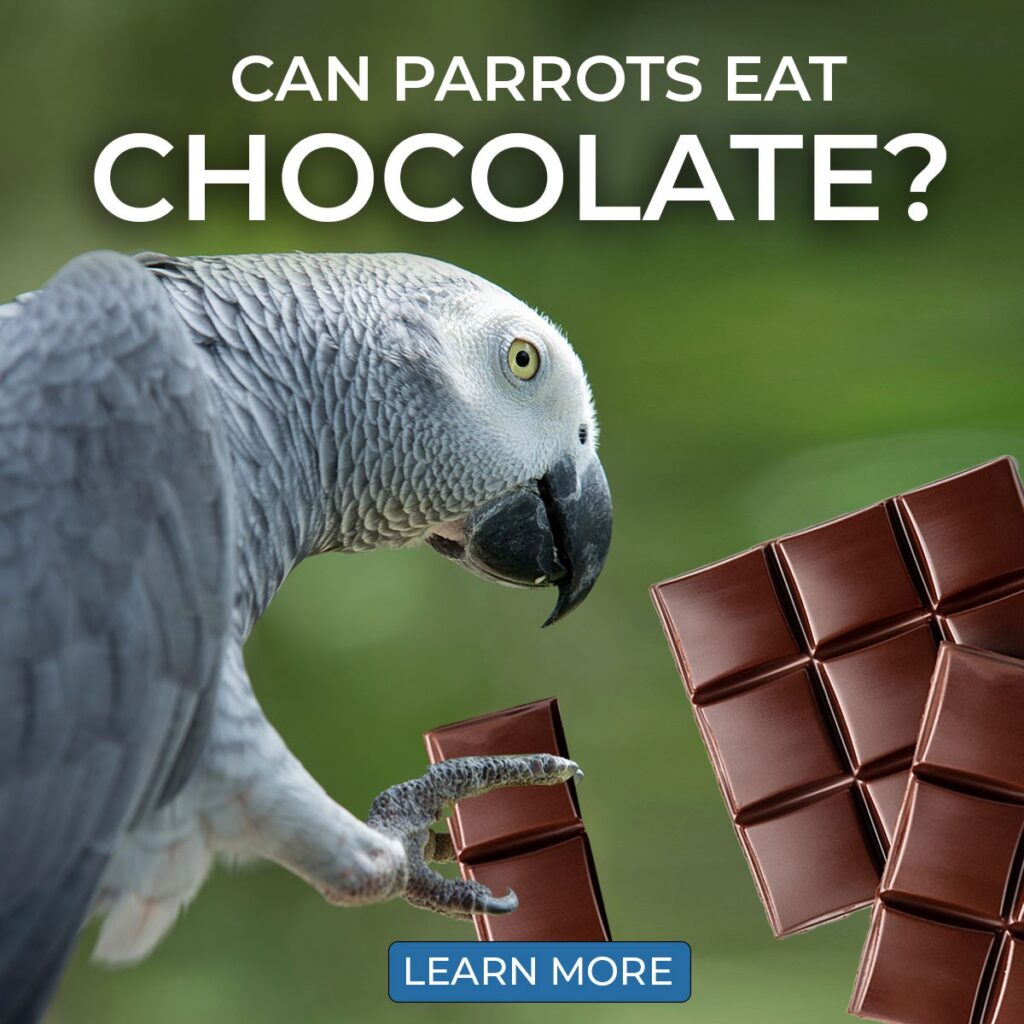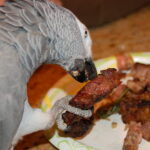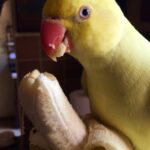Parrots cannot eat chocolate. Chocolate is toxic to parrots and can cause severe health issues or death.
Parrots are beloved pets known for their vibrant colors and playful nature. Owners often wonder what treats are safe for their feathered friends. Chocolate, a popular human snack, poses a significant threat to parrots. Theobromine and caffeine, found in chocolate, are harmful to birds.
These substances can cause rapid heart rate, seizures, and even death in parrots. It’s crucial to avoid giving chocolate or any chocolate-containing products to your parrot. Instead, offer bird-safe treats like fruits and vegetables. Always prioritize your parrot’s health and well-being by being mindful of their diet.
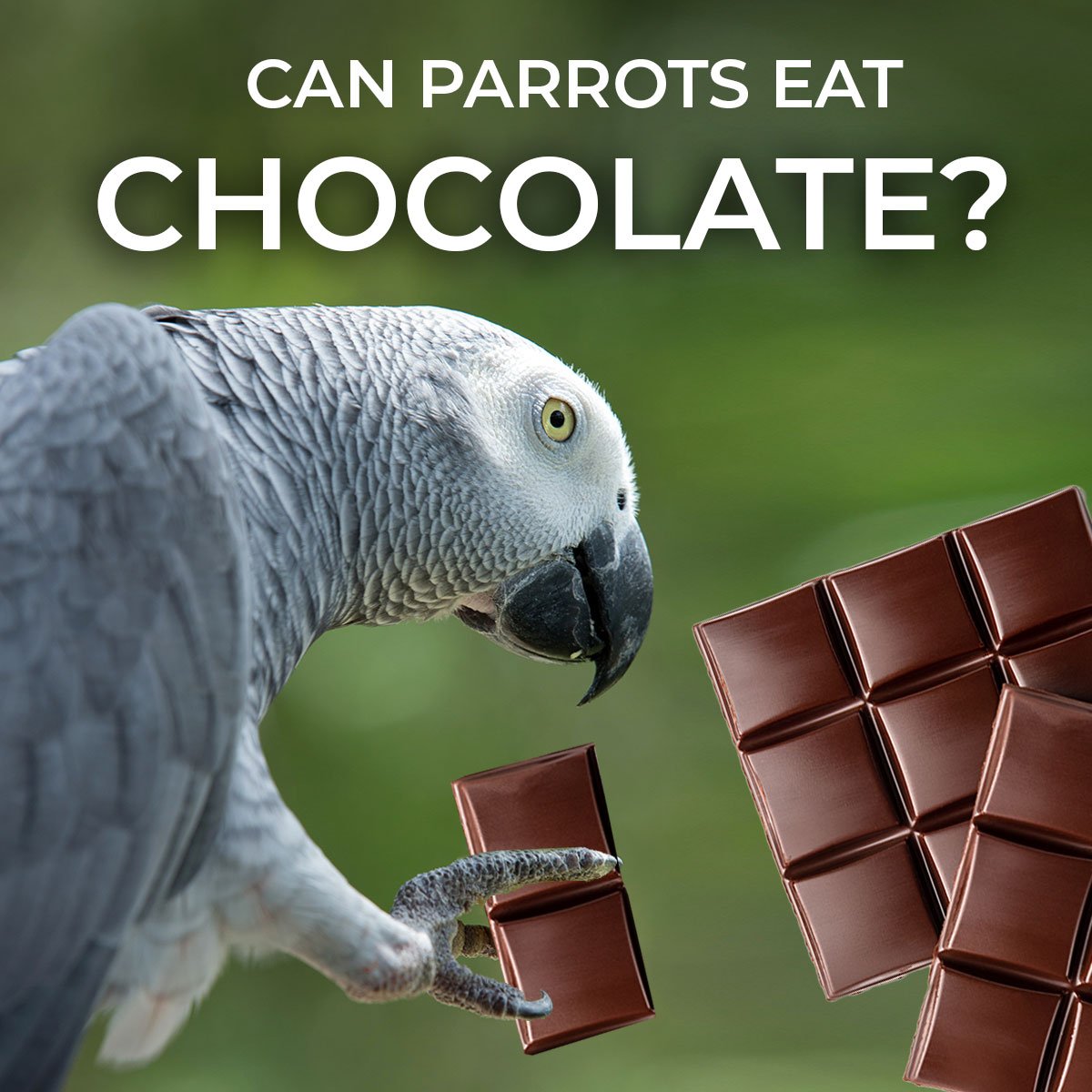
Credit: blog.parrotessentials.co.uk
Introduction To Parrots And Diet
Parrots are colorful, intelligent birds with unique dietary needs. Their diet affects their health, mood, and lifespan. Understanding what parrots can eat is crucial.
Common Foods For Parrots
Parrots enjoy a variety of foods. Here are some common choices:
- Fruits: Apples, bananas, and berries.
- Vegetables: Carrots, spinach, and peas.
- Nuts: Almonds, walnuts, and pecans.
- Grains: Brown rice, oats, and quinoa.
Importance Of Diet
A balanced diet is vital for parrots. It ensures they get all necessary nutrients. Poor diet leads to health problems.
Here are key reasons why diet matters:
- Health: Proper diet prevents diseases.
- Energy: Good food keeps parrots active.
- Longevity: Healthy diet extends their lifespan.
| Food Type | Examples | Benefits |
|---|---|---|
| Fruits | Apples, Bananas | Vitamins, Hydration |
| Vegetables | Carrots, Spinach | Fiber, Minerals |
| Nuts | Almonds, Walnuts | Healthy fats, Protein |
Chocolate And Its Components
Chocolate is a popular treat for humans. But, can parrots eat chocolate? Understanding the components of chocolate can help. Chocolate contains various ingredients. Some of these can be harmful to birds.
What Makes Chocolate Harmful?
Chocolate has ingredients that are toxic to parrots. The main culprits are theobromine and caffeine. Both can cause serious health issues in birds. These compounds affect the central nervous system and heart.
Toxic Ingredients In Chocolate
Here’s a table to summarize the harmful ingredients:
| Ingredient | Effects on Parrots |
|---|---|
| Theobromine | Increases heart rate, can cause seizures and tremors |
| Caffeine | Causes hyperactivity, increases heart rate, can lead to death |
Even small amounts of these substances can be dangerous. Birds have a higher sensitivity to these toxins. Always keep chocolate away from your feathered friend.
Effects Of Chocolate On Parrots
Parrots are curious and love to try new foods. But not all foods are safe. One harmful food is chocolate. Let’s explore the effects of chocolate on parrots. Understanding these effects can help keep our feathered friends healthy.
Immediate Symptoms
Chocolate contains theobromine and caffeine. These are toxic to parrots. After eating chocolate, parrots may show immediate symptoms. Look for signs like:
- Vomiting
- Diarrhea
- Increased heart rate
- Seizures
These symptoms can appear quickly. Even a small amount of chocolate can cause harm. Act fast if you see any of these signs.
Long-term Health Risks
Chocolate can cause long-term health risks in parrots. Continuous exposure can damage their organs. Some risks include:
- Heart problems
- Liver damage
- Kidney failure
These issues can shorten a parrot’s life. It’s vital to avoid feeding them chocolate. Prevention is the best way to protect their health.
Credit: www.reddit.com
Case Studies And Real-life Examples
Chocolate is a common treat for humans, but it can be deadly for parrots. This section explores documented incidents and veterinary insights on parrots consuming chocolate.
Documented Incidents
Many parrot owners have shared stories about their pets accidentally eating chocolate. These incidents often lead to serious health issues for the birds.
Example 1: A parrot named Charlie ate a small piece of chocolate. Within hours, Charlie showed signs of distress, including vomiting and rapid breathing.
Example 2: A parrot owner left chocolate unattended. Their parrot, Coco, nibbled on it. Coco experienced seizures and required immediate medical attention.
Veterinary Insights
Veterinarians often treat parrots for chocolate toxicity. They provide valuable insights on why chocolate is harmful to birds.
| Veterinarian | Insight |
|---|---|
| Dr. Smith | Chocolate contains theobromine, which is toxic to parrots. |
| Dr. Johnson | Even small amounts can cause severe symptoms in birds. |
Some common symptoms of chocolate toxicity in parrots include:
- Vomiting
- Diarrhea
- Seizures
- Rapid breathing
Veterinarians recommend keeping chocolate away from parrots. In case of accidental ingestion, seek immediate veterinary care.
Alternatives To Chocolate For Parrots
Parrots should never eat chocolate. It is toxic for them. Instead, offer them healthy and safe treats. There are many delightful alternatives to chocolate for parrots. These alternatives can keep your feathered friend happy and healthy.
Safe Treats
Safe treats are essential for a parrot’s diet. Here are some options:
- Fruits: Apples, bananas, and berries are great.
- Vegetables: Carrots, broccoli, and peas are safe.
- Nuts: Almonds and walnuts in small amounts are good.
- Seeds: Sunflower seeds and pumpkin seeds are ideal.
Healthy Snack Options
Healthy snacks provide nutrition and keep parrots active. Here are some healthy snack options:
| Snack | Benefits |
|---|---|
| Fresh Berries | Rich in vitamins and antioxidants. |
| Carrot Sticks | High in beta-carotene and fiber. |
| Broccoli Florets | Loaded with vitamins and minerals. |
| Almonds | Good source of protein and healthy fats. |
Offering these alternatives ensures your parrot stays healthy. Always provide fresh water and monitor their diet.
Preventing Accidental Consumption
Parrots are curious and love to explore their environment. This curiosity can sometimes lead to dangerous situations, such as accidentally eating chocolate. Chocolate is toxic to parrots and can cause severe health issues. Therefore, it’s crucial to take steps to prevent accidental consumption.
Parrot-proofing Your Home
Creating a safe environment for your parrot is essential. Here are some tips to parrot-proof your home:
- Keep chocolate and other harmful foods out of reach.
- Store chocolate in sealed containers or cabinets.
- Supervise your parrot during free-roaming time.
- Avoid eating chocolate near your parrot.
- Educate family members about the dangers of chocolate for parrots.
Emergency Steps
If your parrot accidentally eats chocolate, follow these emergency steps:
- Stay calm and assess the situation.
- Remove any remaining chocolate from the parrot’s reach.
- Contact your veterinarian immediately for advice.
- Provide the vet with details about the chocolate consumed.
- Follow the vet’s instructions carefully.
Quick action can save your parrot’s life. Always keep your vet’s contact information handy.
Expert Opinions
Many parrot owners worry about their bird’s diet. One common question is, “Can parrots eat chocolate?” We gathered opinions from experts to give you clear answers. Read on to find out what veterinarians and parrot care specialists say.
Veterinarian Advice
Veterinarians strongly advise against giving chocolate to parrots. Chocolate contains theobromine and caffeine, which are toxic to birds. Even a small amount can cause serious health issues.
Dr. Jane Doe, a well-known avian vet, explains:
- Theobromine affects the nervous system.
- It can cause seizures.
- It can lead to death.
Veterinarians suggest keeping chocolate away from your parrot at all times.
Parrot Care Specialists
Parrot care specialists also warn against chocolate. They emphasize the importance of a healthy diet for parrots. Specialists suggest sticking to fruits, vegetables, and specially formulated bird food.
John Smith, a parrot care expert, says:
- Chocolate is not a natural food for parrots.
- It can cause digestive issues.
- It can lead to long-term health problems.
Specialists recommend safe treats like apples or carrots instead.

Credit: www.youtube.com
Conclusion And Key Takeaways
In this section, we summarize the crucial points about feeding chocolate to parrots. It’s essential to understand the risks and our final recommendations.
Summary Of Risks
Feeding chocolate to parrots is dangerous. Chocolate contains theobromine and caffeine, both toxic to parrots. Even small amounts can cause severe health issues.
- Chocolate can cause vomiting and diarrhea.
- It may lead to seizures and tremors.
- In severe cases, it can cause death.
Chocolate should never be part of a parrot’s diet. Always keep chocolate away from parrots.
Final Recommendations
To ensure your parrot’s health, follow these guidelines:
- Never feed your parrot any type of chocolate.
- Offer safe, bird-friendly treats instead. Examples include fruits and vegetables.
- Always consult a vet before introducing new foods.
Keeping your parrot safe from harmful foods is crucial. Be vigilant and informed about their diet.
Conclusion
Parrots should never eat chocolate. It contains theobromine, which is toxic to them. Always choose bird-safe treats. Keep chocolate out of reach and consult a vet for diet advice. Protecting your parrot’s health is crucial. Make informed choices to ensure your feathered friend’s safety and well-being.
Ryan Everhart is a passionate bird enthusiast and blogger, primarily writing on his website, Avian Whispers. His journey into the world of bird blogging began with a deep interest in parrots, a species that captivated his attention for their intelligence and social behavior. Over time, his content expanded to cover a broader range of bird species, offering insights into bird behavior, care, habitats, and conservation.
Ryan is dedicated to educating his audience, which includes both new bird owners and seasoned enthusiasts. His writing is filled with personal experiences, expert knowledge, and practical advice on bird care. Through Avian Whispers, he aims to foster a deeper appreciation for birds, emphasizing their role in nature and the joys of having them as pets.
Starting with articles focused on parrots, Ryan’s work now encompasses a diverse range of topics such as feeding, training, habitat enrichment, and bird health. His love for birds extends beyond parrots, diving into various avian species. His informative and heartfelt writing reflects his commitment to the well-being of birds and the desire to help others connect with these creatures.
As a growing voice in the bird blogging community, Ryan strives to provide a platform where bird lovers can learn, share experiences, and connect over a shared passion for avian life. His blogs are not only educational but also serve as a reminder of the importance of protecting and nurturing the bond between humans and birds.

